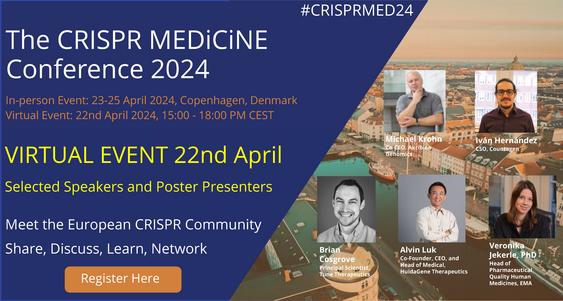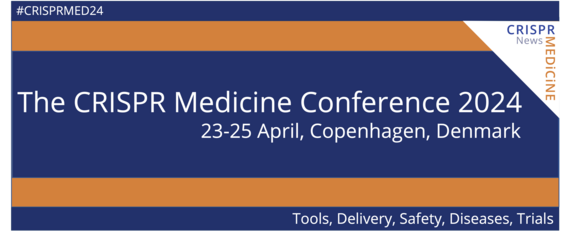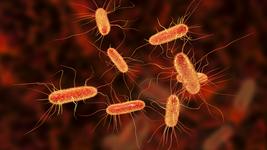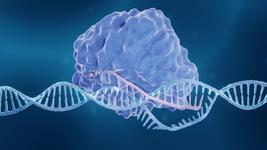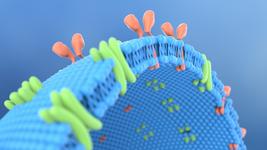CMN Weekly (30 July 2021)
By: Karen O'Hanlon Cohrt - Jul. 30, 2021
Top picks
- Researchers in China and the US show that brain-wide Cas9-mediated cleavage of a mutated form of the gene encoding amyloid-beta precursor protein (APP), which is implicated in familial Alzheimer's disease, alleviates amyloid-related pathologies in mice. The findings raise the potential of using CRISPR as a viable treatment strategy for Alzheimer’s and were published in Nature Biomedical Engineering this week.
- CRISPR breaks ground as a one-shot treatment for a rare disease. This writeup at Popular Science summarises the recent milestones and breakthroughs for CRISPR in vivo therapy and looks at what is coming next for the technology.
Clinical news
- The University of California, San Francisco has been awarded almost $8.4 million from the California Institute for Regenerative Medicine. The money will be used to fund a Phase 1/2 clinical trial for CRISPR_SCD001, the first non-viral and CRISPR-Cas9-based gene editing therapy for sickle cell disease (SCD). CRISPR_SCD001 is designed to correct a genetic mutation in the blood stem cells of patients with severe SCD. You can read more about CRISPR_SCD001 in one of our early trial updates.
Industry
- ERS Genomics and Japanese biotech company Japan SLC sign CRISPR-Cas9 license agreement that will allow Japan SLC to develop CRISPR-Cas9-edited animal models for the research community.
- Life science group Sartorius and BRAIN Biotech AG announce that they are are jointly researching and adapting a portfolio of novel CRISPR-Cas genome editing nucleases for specific applications in the field of life sciences. Sartorius is testing the novel nucleases in a range of cell lines to increase performance as well as improve the entire development and manufacturing process of future pharmaceuticals in a cost-effective manner.
- Editas Medicine and Integrated DNA Technologies (IDT) announce a new publication in Nature Communications of research findings that support the potential of optimised AsCas12a nuclease variant Alt-R A.S. Cas12a (Cpf1) Ultra, for use in developing future gene-edited cellular therapies. The full publication can be found here.
- CRISPR Therapeutics provides business update and reports financial results for the second quarter of 2021. The update covers clinical data on CTX001 for the treatment of sickle cell disease and beta thalassemia as well as updates concerning other CRISPR-edited cell therapy candidates in its portfolio.
Research
- This week, researchers in the US reported a universal dimmer switch element that allows precise control of gene editing or gene replacement after exposure to a small molecule. The work revealed that Novartis’ investigational drug branaplam could fine-tune the expression of a virally-delivered erythropoietin gene therapy in mice, which is used to treat a chronic kidney disease. The team, which includes scientists from Novartis, call the switch system Xon and the findings were published in Nature this week.
- In an article published in Nature this week, a team of scientists report using CRISPR-Cas9-based genetic engineering to create a special class of male mosquitoes carrying gene drives that could exterminate the mosquitoes that carry malaria.
- A study published in PLOS One yesterday describes a Boeing-sponsored International Space Station (ISS) experiment showing that CRISPR gene editing can be used in space. In the study, CRISPR was applied to yeast cells aboard the ISS to create precise breaks in genomic DNA to examine DNA repair processes.
- Until recently, CRISPR-Cas was believed to be non-functional in the most widely-used model bacterium E. coli. Researchers at Pennsylvania State University, US and Jeonbuk National University, South Korea have now shown that CRISPR-Cas is active in E.coli and inhibits its nine defective (i.e., cryptic) prophages. Deactivation of CRISPR-Cas resulted in reduced growth, increased death and prevented persister cell resuscitation, highlighting the important role of CRISPR in this species. The findings were shared on the preprint server bioRxiv this week.
- A team of scientists has reported construction of a hypoxia-responsive gold nanorods (AuNRs)-based nanocomposite of CRISPR-Cas9 for mild-photothermal therapy via tumour-targeted gene editing. In the study, the researchers succeeded in selectively knocking out Hsp90α in the tumour microenvironment, leading to reduced thermal-resistance of cancer cells upon exposure to mild photothermal therapy. The findings were recently published in Angewandte Chemie.
Reviews
Potential of helper-dependent Adenoviral vectors in CRISPR-cas9-mediated lung gene therapy. This review discusses the current status of CRISPR-Cas9 approaches to cystic fibrosis (CF) therapy and associated challenges. The potential of CRISPR-Cas9-mediated lung gene therapy using helper dependant adenoviral (HD-Ad) vectors with CF as a model is also discussed.
External stimuli-responsive nanoparticles for spatially and temporally controlled delivery of CRISPR-Cas genome editors. This review summarises the state-of-the-art non-viral vectors that exploit external stimuli such as light, magnetic field and ultrasound for spatially and temporally-controlled genome editing and their in vitro and in vivo applications.
Conferences
- CRISPR and Beyond: Perturbations at Scale to Understand Genomes. A virtual conference organised by Wellcome Connecting Science. Dates: 1st-3rd September 2021. Read more about it here.
- CRISPR 2.0 Summit. A virtual conference running between November 16th-18th, 2021. Registration is now open with an early-bird discount. Read more about it here.
Huh, heh, wow
- The documentary Human Nature, which spotlights the CRISPR revelation in genetic modification research, has received 3 Emmy nominations for Outstanding Science and Technology, Outstanding Editing of a Documentary, and Outstanding Graphic Design and Art Direction of a Documentary.
Tags
CLINICAL TRIALS
IND Enabling
Phase I
Phase II
Phase III
Chronic Granulomatous Disease, CGD, (NCT06325709)
Sponsors:
National Institute of Allergy and Infectious Diseases (NIAID)
Sponsors:
National Institute of Allergy and Infectious Diseases (NIAID)
IND Enabling
Phase I
Phase II
Phase III
IND Enabling
Phase I
Phase II
Phase III
